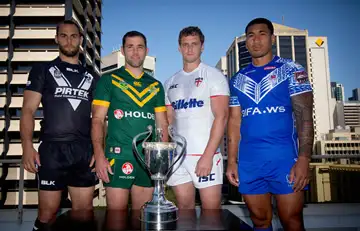Five things we learned from England v Samoa

Shaun Johnson’s try… what if?
Had Shaun Johnson not scored that try in the dying seconds of the World Cup semi-final last year, I wonder how different international rugby league would be now.
There is no World Cup legacy. Not one. Forget the lip service paid through lip service, the work, or rather lack of, done to build on the momentum started by the World Cup is nothing short of a disgrace.
The press box at Wembley when Johnson slid over was the most muted place I’ve ever experienced as a journalist. I think everybody knew how important a win, and an English appearance in the World Cup final, might have been. The attention the sport would have got may well have jolted some sort of reaction from those at the top in to ensuring that international rugby league wasn’t treated with the same apathy as it appears to be in 2014.
I don’t think anyone imagined the next time we would see the England side it would be in a competitive Four Nations match, and competitive it was. A 32-26 win over a spirited Samoa side.
“It’s not the same as English rugby league”
One of the issues holding back rugby league on the international stage is that the sport is not united. Down Under, they play to different rules.
As Pita Godinet slid over for one of his two instinctive efforts, Ian Millward remarked “it’s not the same as English rugby league.”
Whether it be how they treat the video referee decisions, how many on-field referees there are or how the obstruction rule works, somebody at the top needs to get a grip of the sport and ensure the whole world is playing to one set of laws – the laws of rugby league. No NRL laws, no RFL laws. Just one, unified set of rugby league laws.
Smith and Widdop show progress
It was largely an underwhelming performance by England. But there were signs of promise in the partnership between Gareth Widdop and Matty Smith in the halves, certainly more so than when Rangi Chase and Kevin Sinfield were paired at the World Cup last year.
Generally, England’s pack is feared and admired, and even in the absence of three of its best, in Sam Burgess, Sean O’Loughlin and James Roby, it should still create the platform for the half-backs to contribute.
Missing Milford
Arguably the most exciting player at the World Cup was Samoa full-back Anthony Milford.
The Brisbane-born and Brisbane-bound Canberra Raiders number one starred in all four of Samoa’s games in the northern hemisphere, earning rave reviews.
But the eligibility of players for international rugby league continues to be an issue. Instead of playing for Samoa in the Pacific Test – and Four Nations qualifier – against Fiji early this year, Milford turned out for Queensland Under 20s, to help boost his chances of representing Queensland in what is currently regarded as the pinnacle of rugby league, State of Origin.
Swapping nations remains a debate that is unanswered. Should Milford be allowed to turn out for Samoa on a year-by-year basis until Australia decide he is good enough to play for them?
And will we ever get to the stage where any player is going to choose to play for a so-called second-tier nation like Samoa, rather than using them as a plan B in case they are never good enough for the Kangaroos, the Kiwis or otherwise.
BBC TV coverage is important
International rugby league needs terrestrial television exposure. Despite the early issues with the commentary being ahead of the play, the coverage was good; two former England captains and Robbie Hunter-Paul in the studio providing the analysis.
We saw people debating the game and its talking points through social media throughout; and rugby league was trending on Twitter, albeit partly down to the lack of competition at that time in the morning.
It also spared us the constant moans on Facebook when games are only available on Premier Sports, who of course also do a great job of at least ensuring there is coverage of rugby league on the box, something which the ongoing European Championship is desperately missing.